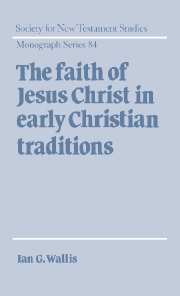Book contents
- Frontmatter
- Contents
- Preface
- Convention for referring to primary and secondary literature
- List of abbreviations
- 1 Setting the scene
- 2 Jesus' faith in the Synoptic Gospels
- 3 Jesus' faith in the Pauline Epistles
- 4 Jesus' faith in the deutero-Pauline and Pastoral Epistles
- 5 Jesus' faith in Hebrews and Revelation
- 6 Jesus' faith in extra-biblical sources
- 7 Concluding remarks
- Select bibliography
- Index of modern authors
- Index of passages
- Index of subjects
4 - Jesus' faith in the deutero-Pauline and Pastoral Epistles
Published online by Cambridge University Press: 22 September 2009
- Frontmatter
- Contents
- Preface
- Convention for referring to primary and secondary literature
- List of abbreviations
- 1 Setting the scene
- 2 Jesus' faith in the Synoptic Gospels
- 3 Jesus' faith in the Pauline Epistles
- 4 Jesus' faith in the deutero-Pauline and Pastoral Epistles
- 5 Jesus' faith in Hebrews and Revelation
- 6 Jesus' faith in extra-biblical sources
- 7 Concluding remarks
- Select bibliography
- Index of modern authors
- Index of passages
- Index of subjects
Summary
Deutero-Pauline Epistles: Ephesians
The deutero-Pauline epistles contain only one occurrence of a construction which resembles Paul's πίστις χριστοῦ and this is significantly different (i.e. διὰ τῆς πίστεως αὐτοῦ, Eph. 3.12). For one thing, πίστις is followed by the personal pronoun αὐτοῦ, referring back to Christ in verse 11, and not χριστοῦ or some other designation; πίστις is also qualified by the definite article. No other πιστεύω cognate is attested in the immediate context with the result that, if διὰ τῆς πίστεως αὐτοῦ relates to Christ's faith, the faith of believers is either excluded or must be accommodated within the same phrase. And finally, the presence of πίστιν ἐν τῷ κυρὶῳ Ἰησοῦ in 1.15 (cf. καὶ πιστοῖς ἐν Χριστῷ Ἰησοῦ, 1.1) demonstrates that the author was familiar with the construction ‘πίστις ἐν plus the dative’ and could have used it in 3.12; had this occurred, the uncertainty over how to relate faith and Christ would have been greatly reduced.
A review of the nature and function of faith in Ephesians reveals a complex structure and one which is perhaps best understood in terms of different perspectives. From one stance, the place of faith within the salvation process is clear: belief either follows from or is consecutive with hearing the gospel; and, on coming to faith, a believer is sealed with the Holy Spirit (1.13).
- Type
- Chapter
- Information
- The Faith of Jesus Christ in Early Christian Traditions , pp. 128 - 144Publisher: Cambridge University PressPrint publication year: 1995



